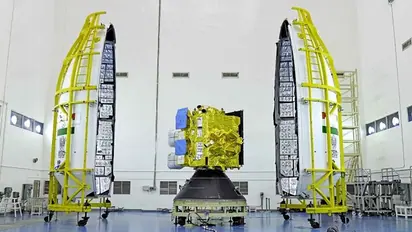ISRO to launch INSAT-3DS spacecraft on February 17; Know timing, mission details

Synopsis
INSAT-3DS, the latest addition to the Indian National Satellite (INSAT) series, serves as a meteorological and disaster warning satellite. Positioned as an enhancement to the existing INSAT-3D and INSAT-3DR satellites, INSAT-3DS extends critical services in monitoring atmospheric and oceanic conditions.
The Indian Space Research Organisation (ISRO) is all set for the launch of the INSAT-3DS spacecraft on February 17 as part of the GSLV-F14 mission. The mission, scheduled to take off at 5:30 pm IST from the Satish Dhawan Space Centre in Sriharikota, marks the 16th flight of ISRO's Geosynchronous Satellite Launch Vehicle (GSLV). The satellite, INSAT-3DS, holds significant capabilities in meteorological and disaster warning services.
On January 25, 2024, the INSAT-3DS satellite arrived at the Satish Dhawan Space Centre, laying the groundwork for its upcoming mission.
'UPA inherited healthy economy, made it non-performing': Centre's 59-page White Paper
INSAT-3DS, the latest addition to the Indian National Satellite (INSAT) series, serves as a meteorological and disaster warning satellite. Positioned as an enhancement to the existing INSAT-3D and INSAT-3DR satellites, INSAT-3DS extends critical services in monitoring atmospheric and oceanic conditions.
Equipped with meteorological payloads, including an atmospheric imager and sounder, it plays a vital role in providing operational, environmental, and storm warnings to safeguard life and property by meticulously monitoring the Earth's surface and oceans.
The satellite, with a lift-off mass of 2,275 kilograms, reflects the collaborative efforts of Indian industries in its realization. INSAT-3DS is meticulously designed to conduct advanced meteorological observations, tracking land and ocean surfaces for weather forecasting and disaster warning.
Centre fires back: India rejects Ottawa's allegations, accuses Canada of internal interference
Among its state-of-the-art payloads are a six-channel imager, a 19-channel sounder, and two communication payloads—Data Relay Transponder (DRT) and Satellite-Aided Search and Rescue (SAS&R) transponder.
The DRT instrument is tasked with receiving meteorological, hydrological, and oceanographic data from automated platforms and weather stations, amplifying weather forecasting capabilities. The SAS&R transponder, embedded within the satellite, serves as a crucial link for relaying distress signals or alerts, facilitating search and rescue operations.
GSLV F14, the launch vehicle for INSAT-3DS, signifies ISRO's 93rd mission and the second mission in the year.
Stay updated with the Breaking News Today and Latest News from across India and around the world. Get real-time updates, in-depth analysis, and comprehensive coverage of India News, World News, Indian Defence News, Kerala News, and Karnataka News. From politics to current affairs, follow every major story as it unfolds. Get real-time updates from IMD on major cities weather forecasts, including Rain alerts, Cyclone warnings, and temperature trends. Download the Asianet News Official App from the Android Play Store and iPhone App Store for accurate and timely news updates anytime, anywhere.